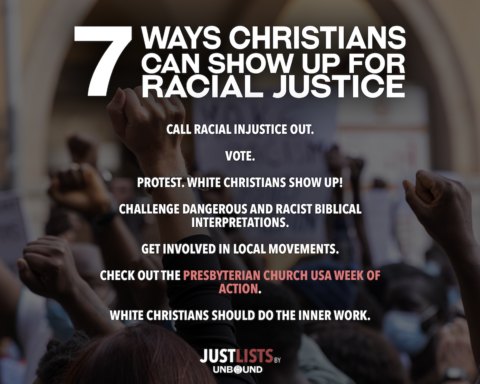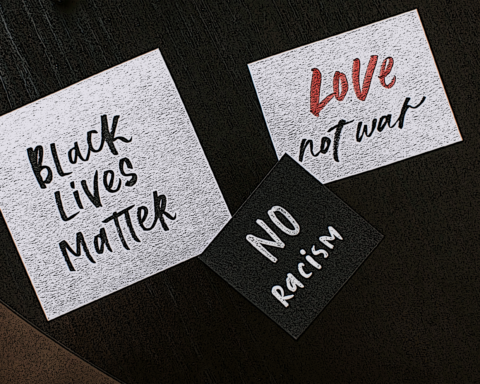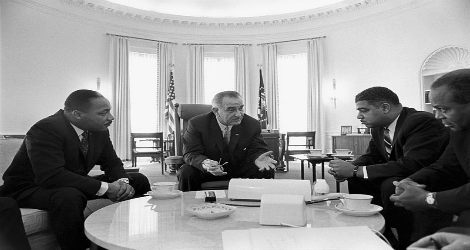A response to an impending resignation
By Chris Iosso, an editorial, which will appear on Ecclesio.com during the week of January 16th when Unbound will serve as guest director of the site. The National Council of Churches of Christ (NCC for short) announced on November 9 that Michael Kinnamon, its General Secretary, would be stepping down early under the advice of his cardiologist, in a situation where the organization faces continued financial distress. This editorial is meant as a blunt yet respectful reflection on the ecumenical choices before the churches and is not official policy. It is rather an inner dialogue between the realist and the one who hopes. The realist leads. The job seems impossible.
The National Council of Churches of Christ (NCC for short) announced on November 9 that Michael Kinnamon, its General Secretary, would be stepping down early under the advice of his cardiologist, in a situation where the organization faces continued financial distress. This editorial is meant as a blunt yet respectful reflection on the ecumenical choices before the churches and is not official policy. It is rather an inner dialogue between the realist and the one who hopes. The realist leads. The job seems impossible.
Face it: denominations want to die (or live?) alone, curled up on themselves. In the 1980s, some moved their national offices somewhat arbitrarily to Cleveland, Louisville, or, more reasonably, Chicago. Message: we don’t need to cooperate. We have our own strategies for growing new congregations, attracting young people, staying together, focusing on the main thing: survival. Ecumenism will not help your career; we need to keep all our remaining money; and our brand of Christianity is, in fact, better than all others. So what if the churches are all going through the same stuff in the same culture with the same people?
Face it: small neoconservative and right wing groups have spent years condemning the word, “ecumenical”; like “liberal,” it often means thoughtful to a fault, open, and all-accepting. Their message is that ecumenism is a disease that weakens evangelical fervor and confuses the faithful with unhelpful facts. Repetitively, these shallow criticisms ignore the good works, the good theological work and the hard-headed social witness that the churches together actually do. The NCC was right about the wars and poverty and racism and the environment…but even if core Christian values do go against the individualism, nationalism, and lack of empathy in our culture, why fight those dominant trends?
___________________________________________
The task: re-ignite a big vision, as if the churches together knew a big Christ who could still heal a desperate world.
___________________________________________
Face it: the long-running battles over gay ordination, unions, and marriage lost the churches some of their most talented and gentle souls as well as some of their most dedicated and tradition-minded. The survivors, even winning, do not let themselves hope for too much change. Those battles have left the churches’ communications systems inwardly focused and their leadership conflict-avoidant, whatever the issue. That conflict avoidance, ironically, makes critical voices seem more threatening. Ecumenism raises questions and brings controversy. Who would take a job that does that?
The task: re-ignite a big vision, as if the churches together knew a big Christ who could still heal a desperate world. Who has that confidence? Isn’t everything broken? Aren’t the mainline churches too wounded? Aren’t their demographics like global warming: irreversibly bad? And to cooperate in pooling resources and practical strategies: who has the trust, the imagination? Could real theological consensus be achieved, and real allies be found for re-building the common good? Who could do that organizing and building?
Michael Kinnamon, the General Secretary who has announced he intends to step down earlier than planned, has performed well while receiving some heart treatment over the past few years. Despite evident warmth and wisdom, by reputation Kinnamon has been too academic, while his predecessor, Bob Edgar, was too much the activist organizer. True, Kinnamon has written several solid books of ecumenical theology and Edgar now leads Common Cause in fighting corruption in our political process, going right up to the Supreme Court. But both men served in seminaries, nurturing future pastors, and they share similar moral convictions. Disclosure: I admire both, and have known several General Secretaries. It is important, however, to value all aspects of the leadership portfolio and the variety of leaders, since no one can fulfill all responsibilities perfectly, and everyone is sometimes more critical of leadership than they would like to be.
___________________________________________
The struggle for equal racial dignity in the churches is a real manifestation of the captivity of the church in a divided society, which is one reason why ecumenism is an important way for churches to build bridges.
___________________________________________
Kinnamon was tasked with turning the National Council of Churches of Christ more toward the churches’ leadership, though not at the expense of active engagement for social justice. He was thus to add more Faith & Order to the Life & Work, to use now-historical terms of art. Unfortunately, while Bob Edgar’s team successfully raised money from secular foundations, particularly for environmental work, the churches have given less money during Kinnamon’s tenure, largely for economic reasons. Kinnamon did succeed in attracting some major gifts—and in efforts like the Social Creed for the 21st Century, a concise consensus document produced with the Presbyterian Church (U.S.A.), uniting both the ecclesiological and ethical strands of ecumenism.
Kinnamon and the other NCC leaders, then, have been making stone soup for some time, while navigating the three most difficult internal dynamics in the Council: the split from its long-time action arm, Church World Service; the struggle with racial and other forms of representation; and the liturgical and cultural differences between the Protestant and Orthodox Churches.
In my view, the split between Church World Service (CWS) and the National Council, however initially justified to sort out finances, is a mistake now, leaving both agencies weakened, with CWS possibly moving further from the orbit and influence of member communions. Both organizations are well intentioned and tightly managed today, but theologically I do not believe their split is justified. Nor, in an entrepreneurial environment, is it clear why there are two ecumenical agencies involving exactly the same players. Thus this split makes the General Secretary’s job harder, in my view, especially if CWS goes the way of the YM/WCAs, into vestigial Christianity.
The struggle for equal racial dignity in the churches is a real manifestation of the captivity of the church in a divided society, which is one reason why ecumenism is an important way for churches to build bridges. The failure of a subset of historic African-American denominations and older mainline Protestant groups to deepen their communion in the Consultation on Church Union (now CUIC, Churches Uniting in Christ), shows how significant the differences are. Those differences were not simply racial, but also included bishops and degrees of elevation among them, which seemed partly to coincide with racial lines. At the same time, some leaders wanted a broader ecumenical table including the Catholics, Evangelicals, and Pentecostals; hence a purely consultative body called Christian Churches Together (CCT) was formed a few years ago, possibly weakening the Council’s own unity and energy.
___________________________________________
Leading such a movement may seem an impossible job for any individual, and a great risk for any organization—but what if nothing less is worth doing?
___________________________________________
The differences between the Protestants, black and white, and the Orthodox, fresher from Eastern Europe and older in liturgical practice, are also significant. Naturally enough, the Orthodox call for orthodoxy and are often uncomfortable with progressive explorations and applications of faith, which they dislike funding. Thus, along with theological differences (which Kinnamon was able in addressing), the Orthodox are generally not big financial contributors—though they are not the only groups in this boat. For the Orthodox, too, the value of Council solidarity as a counterweight to the Roman Catholic Church’s influence may be waning as the Catholic Church itself weakens. Why stay in if your internal and external rationales hold up less—unless you really want to contribute a deep sense of tradition to contemporary Christian witness? Despite my personal respect for the Orthodox, their doctrine-based inability to share communion with Protestants severely limits the reality of ecumenical unity.
The National Council’s own tradition has been to be a place where new ideas and brave causes, like economic, racial, gender, and now environmental justice, could be pursued (the encounter with gay Christians largely excepted). One can imagine various stripped down and specialized versions of the Council, but the question increasingly before the churches is: what vision is left? And for the mainline Protestant churches, for whom church union is ironically often a dirty word—despite their enormous overlaps among members—would it not be more sensible simply to get closer to those with whom one has the most in common?
For the Reformed family, the logical links would be among Presbyterians, United Church of Christ, Reformed and Christian Reformed, and, with some accommodation to their non-creedalism, the Disciples of Christ. Despite great proximity in cooperative work and cultural location, the rule of bishops in the Episcopal, Methodist, and Lutheran churches remains a great stumbling block. Most of the historic African-American churches also have bishops—and challenges around the ordination of women in some circles. So the logic of ecumenism has to be greater than “church structure”—or was that a 20th Century fantasy? As to the nature of any future linkages among denominations, who has the creativity to devise new and practical forms of unity, even if these were desired? Are we not in a time when it’s all grass roots and net roots, when we should abandon structured organizations? (tell this to the universities and corporations).
We face tough questions: How do we reverse climate change and move beyond empire—and in doing so witness to the living Christ who calls us to be one? How do the churches help renew values and virtues in a country de-moralized by inequality and injustice? Faced with these challenges and an increasingly divided population, with political ideology further reinforcing secular and religious identities, any General Secretary must be able to preach a moral and missional unity of purpose with an added theological diagnosis of the spiritual hunger in our culture. Leading such a movement may seem an impossible job for any individual, and a great risk for any organization—but what if nothing less is worth doing?
 Find out more about the National Council of Churches
Find out more about the National Council of Churches
- Inside the National Council of Churches
- “NCC Announces Kinnamon’s Departure, Transition Plans“
- NCC Eco-Justice Programs
- NCC Poverty Initiative
- Ecumenical Peace Ministries of the NCC
- FaithConnectUs: Shared Web tool to connect ecumenically engaged young adults through awareness, education, and the building up of relationships.
- Ecumenical Advocacy Days
- Racial Justice Working Group
- Justice for Women Working Group
- Support the NCC with a donation today
 The Rev. Dr. Christian Iosso is the Coordinator of the Advisory Committee on Social Witness Policy of the Presbyterian Church (U.S.A.) and the Senior Editor of Unbound. His Master of Divinity comes from Princeton Theological Seminary and his Ph.D., from Union Theological Seminary in New York City.
The Rev. Dr. Christian Iosso is the Coordinator of the Advisory Committee on Social Witness Policy of the Presbyterian Church (U.S.A.) and the Senior Editor of Unbound. His Master of Divinity comes from Princeton Theological Seminary and his Ph.D., from Union Theological Seminary in New York City.






Unbound Social